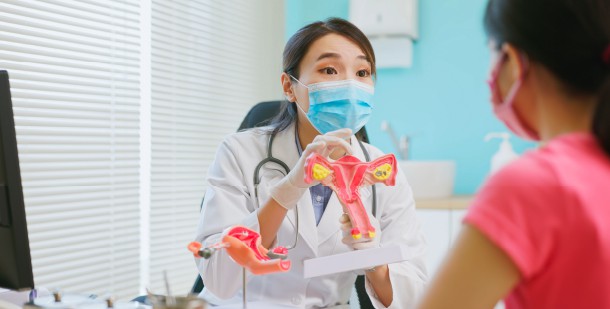In this article, we delve into a topic that affects the lives of countless women: endometriosis vs. PCOS (polycystic ovarian syndrome). While both conditions are related to the female reproductive system and can cause significant discomfort and challenges, they have distinct characteristics, causes, and symptoms. Keep reading to learn more.
What is Endometriosis?
Endometriosis is a chronic and often painful medical condition that occurs when tissue similar to the tissue in the uterine lining grows outside the uterus, typically in the pelvic region. These abnormal growths can appear on various reproductive organs such as the ovaries, fallopian tubes, and the lining of the pelvis.
During the menstrual cycle, this endometrial tissue thickens, breaks down, and bleeds just like the normal endometrium. However, because there is no natural exit for this blood, it becomes trapped inside the body. This can cause inflammation, scarring, and the formation of adhesions (scar tissue that inappropriately connects two internal body surfaces).
The exact cause of endometriosis is unknown, but it is believed to be the result of a combination of genetic, hormonal, and immune system factors.
Symptoms
Being aware of the symptoms of endometriosis can help women know when to seek help. Symptoms of this condition may include:
- Pelvic Pain
- Heavy or Irregular Menstrual Periods
- Bleeding Between Periods
- Pain During Intercourse
- Infertility
- Gastrointestinal Discomfort

What is PCOS?
PCOS, or polycystic ovarian syndrome, is a common hormonal disorder that affects post-pubescent women. This disorder will cause multiple small cysts to appear on the ovaries, irregular menstrual cycles, and excessive production of androgens (male hormones), and insulin resistance.
PCOS is also associated with an increased risk of developing other health conditions, such as type 2 diabetes, high blood pressure, and cardiovascular disease.
The exact cause of PCOS is not fully understood, but like endometriosis, it is believed to involve a combination of genetic and environmental factors.
Symptoms
Symptoms of PCOS can vary from case to case, but they normally include the following in different degrees of severity:
- Absent or Irregular Periods
- Prolonged or Heavy Bleeding During Menstrual Cycles
- Excess Hair Growth (Hirsutism)
- Acne
- Weight Gain or Difficulty Losing Weight
- Infertility
Women with PCOS may not experience all of these symptoms, but may still have the hormonal imbalances and cysts that characterize the disorder.
Endometriosis vs. PCOS: What’s the Difference?
Understanding the main difference between these two disorders will better equip patients to deal with their conditions. The main difference between polycystic ovarian syndrome (PCOS) and endometriosis can be found in the specific symptoms they manifest and in the natures of the disorders themselves.
While both conditions can cause irregular menstrual cycles and fertility issues, their underlying mechanisms and specific symptoms are distinct. PCOS results from irregular hormone levels and causes the development of cysts on the ovaries, whereas endometriosis involves the abnormal growth of endometrial tissue outside the uterus and is a disorder that is anatomical rather than hormonal in nature.
Treatment for Endometriosis
The treatment for endometriosis depends on various factors, such as the severity of symptoms, the extent of the condition, and the individual’s goals, including fertility desires.
Treatment options for endometriosis can include:
- Pain medication to alleviate mild to moderate pain associated with endometriosis. Prescription pain medications may be necessary for more severe pain.
- Hormonal therapy to regulate or suppress hormonal fluctuations that stimulate the growth of endometrial tissue. Birth control pills are an example of a commonly prescribed hormone treatment.
- Laparoscopic surgery to remove or destroy the endometrial implants and any adhesions present in the body. This can provide relief from symptoms and improve fertility.
- A hysterectomy in severe cases when other treatment options have been exhausted or if a woman no longer desires to have children. This procedure can provide long-term relief from endometriosis symptoms.
Treatment for PCOS
There is no cure for PCOS, but it can be managed through maintaining a healthy diet, exercising regularly, and managing stress effectively. Medications may also be prescribed to help regulate menstrual cycles, reduce androgen levels, and improve fertility if desired.
It is important for women with PCOS to work closely with healthcare professionals to address their specific symptoms and minimize potential complications.
When to Seek Treatment for PCOS and Endometriosis
Both endometriosis and polycystic ovarian syndrome are chronic conditions that require prompt and regular medical attention.
By seeking medical help, patients can receive a proper evaluation, undergo diagnostic tests, and discuss treatment options to manage endometriosis and PCOS effectively.
Early diagnosis and intervention for both of these conditions can help alleviate symptoms, improve quality of life, and improve fertility.

Take the Road to Village Today
When it comes to your health and well-being, it’s crucial to seek out the help and support you need for endometriosis, PCOS, or any medical emergency. Trust in Village as a reliable and compassionate option for caring for your medical needs. Our dedicated team of healthcare professionals is equipped to provide prompt and high-quality care, any time of day or night. Visit our website to learn more.
